John H. Jackson
b. February 25th, 1924 in Woodville (Virginia)
d. January 20th, 2002 in Fairfax Station (Virginia)
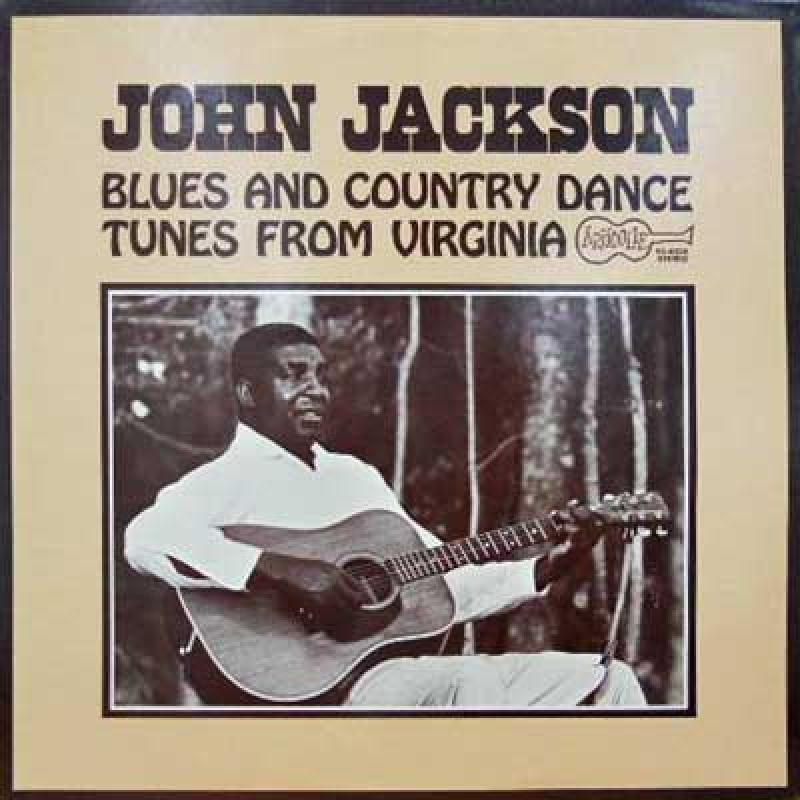
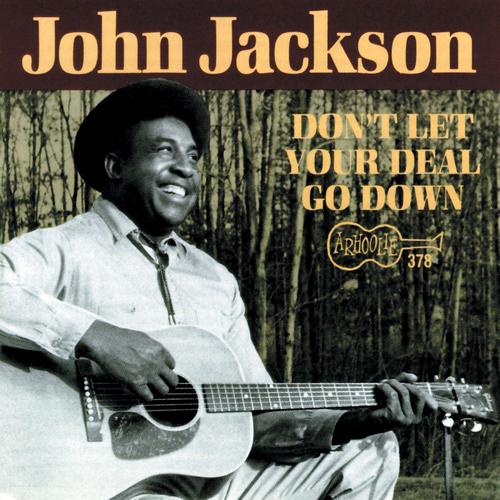
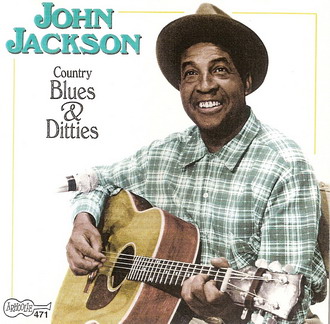
BLUES AND COUNTRY DANCE TUNES FROM VIRGINIA
Arhoolie
DON'T LET YOUR DEAL GO DOWN
Arhoolie
COUNTRY BLUES & DITTIES
Arhoolie
April 1965
Natif de Woodville en Virginie, John H. Jackson est le septième des quatorze enfants de Suttie et Hattie Jackson. Dans cette famille de métayers misérables, tout le monde joue de la musique : Suttie est guitariste et Hattie souffle dans un harmonica. Enfant, John est très vite attiré par cette ambiance musicale. Il prend exemple sur son père et apprend la guitare en le regardant jouer. En 1944, il se marie avec Cora Lee Carter et part vivre à Fairfax ou il restera toute sa vie. Il exercera de nombreux métiers comme chauffeur, cuisinier, gardien puis deviendra fossoyeur dans le cimetière de la ville. Il créera même une petite entreprise de pompes funêbres qu'il administrera longtemps. Découvert en 1964 par le folkloriste Charles "Chuck" Perdue, professeur de l'Université de Virginie, John se laisse finalement convaincre de faire une série de concerts dans la région. Lors de l'un d'entre eux, il fait la rencontre de Chris Strachwitz à la recherche d'artistes locaux pour son label Arhoolie. Strachwitz, très impressionné par la technique ébouriffante de John, le persuade finalement d'enregistrer pour lui. Cette rencontre va déboucher sur une longue séance (onze heures selon certaines sources) gravée sur un enregistreur portable en avril 1965. Songster capable de jouer dans tous les styles (blues, ragtime, country, airs folkloriques), il possède, en outre, une technique très complète à la guitare (et au banjo) lui permettant d'aborder aussi bien le fingerpicking, flat-picking que la slide. Plusieurs réussites majeures ont été gravées ce jour-là : "Nobody's business but my own", "Going down in Georgia on a horn", "Don't let your deal go down", "If Hattie wants to lu, let her lu like a man" ou il montre ses talents au banjo, le traditionnel "John Henry" ou il joue de la slide. Mais aussi plusieurs reprises de classiques parfaitement rendus comme "Rattlesnakin' daddy", "Diddy wa diddy" et "T.B. blues". Le microsillon original sera réédité en 1970 avec d'autres versions de certains morceaux enregistrés en 1969. Dans les CDs "Don't let your deal go down" et "Country blues & ditties" sont recueillis une partie des titres des 3 lps originaux de John chez Arhoolie et des faces inédites provenant des mêmes séances.
Born in Woodville Virginia, John H. Jackson is the seventh of Suttie and Hattie Jackson's fourteen children. In this poor sharecroppers family, everyone plays music : Suttie is a guitarist and Hattie blows her harmonica. As a child, John is quickly attracted by this musical atmosphere. He follows his father's example and learned to play guitar by watching him play. In 1944, he married Cora Lee Carter and went to live in Fairfax where he will remain all his life. John had many jobs like truck driver, cook, keeper then become gravedigger in the cemetery of the city. He even created his own funeral company. Discovered in 1964 by folklorist Charles "Chuck" Perdue, professor at the University of Virginia, John is finally convinced to give a series of concerts in the region. During one of them, he meets Chris Strachwitz looking for local artists to record for his Arhoolie label. Strachwitz, very impressed by John's astonishing technique finally persuaded him to record for his label. This meeting will lead to a long session (eleven hours according some sources) recorded on a portable recorder in april 1965. Songster able to play in all styles (blues, ragtime, country, folk tunes), John has, in addition, a comprehensive guitar technique (and banjo) allowing him to play indifferently on fingerpicking, flat picking or slide. Several major songs have been cut on that day : "Nobody's business but my own", "Going down in Georgia on a horn", "Don't let your deal go down", "If Hattie wants to lu, let her lu like a man" where he shows his talents on banjo, the traditional "John Henry" in which he plays slide guitar. But also some perfectly rendered covers like "Rattlesnakin' daddy", "Diddy wa diddy" and "T.B. blues". The original LP will be reissued in 1970 with other versions of some songs recorded in 1969. In "Don't let your deal go down" and "Country & blues ditties" CDs are collected some of the titles of the 3 Arhoolie original LPs and unpublished sides from the same sessions.
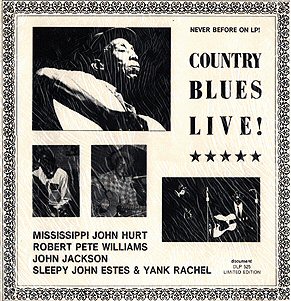
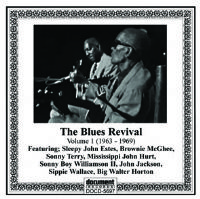
COUNTRY BLUES LIVE
Document
THE BLUES REVIVAL vol.1
Document
1966 ?
Grâce aux efforts de Chuck Perdue et de Chris Strachwitz, sa renommée grandit et il figure à l'affiche de nombreux festivals (Newport, Philadelphie). Dans ce disque, on trouve quatre belles faces gravées au Folk Festival de Washington vers 1966 par un John Jackson en pleine possession de ses moyens.
Through the efforts of Chuck Perdue and Chris Strachwitz, his fame grew and he played in many festivals (Newport, Philadelphia). On this record, we find four beautiful sides cut in Washington Folk Festival around 1966 by John Jackson in full possession of his faculties.
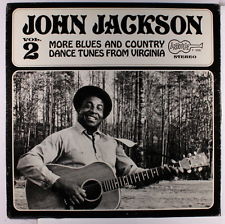


MORE BLUES AND COUNTRY DANCE TUNES FROM VIRGINIA
Arhoolie
DON'T LET YOUR DEAL GO DOWN
Arhoolie
COUNTRY BLUES & DITTIES
Arhoolie
December 1967
Après le résultat remarquable de la séance d'avril 1965, Chris Strachwitz organisa une deuxième session au début du mois de décembre 1967 qui aboutira à un second microsillon pour Arhoolie. John Jackson y montre, une nouvelle fois, l'étendue de ses talents. Il rend hommage à ses deux influences majeures que sont Blind Blake ("Police dog blues") et Blind Boy Fuller ("Death of Blind Boy Fuller"). On le retrouve au banjo dans "Going up north" et "You left me". Mais, on pourrait également citer "Muleskinner blues", "Going down the road feeling bad", le superbe "John's guitar boogie" ou la nouvelle interprétation de "Don't let your deal go down". Comme précédemment, les 2 CDs "Don't let your deal go down" et "Country blues & ditties" reprennent une partie de la séance agrémentée de quelques inédits.
After the major achievement of april 1965 session, Chris Strachwitz organized a second session in early december 1967 which resulted in a second LP for Arhoolie. John Jackson show there, once again, the extent of his talents. He honors his two major influences that are Blind Blake ("Police dog blues") and Blind Boy Fuller ("Death of Blind Boy Fuller"). He plays banjo in "Going up north" and "You left me". But we could also mention "Muleskinner blues", "Going down the road feeling bad", the superb "John's guitar boogie" or his new rendition of "Don't let your deal go down". As before, the 2 CDs "Don't let your deal go down" and "Country blues & ditties" collect a part of this session with some unpublished sides.
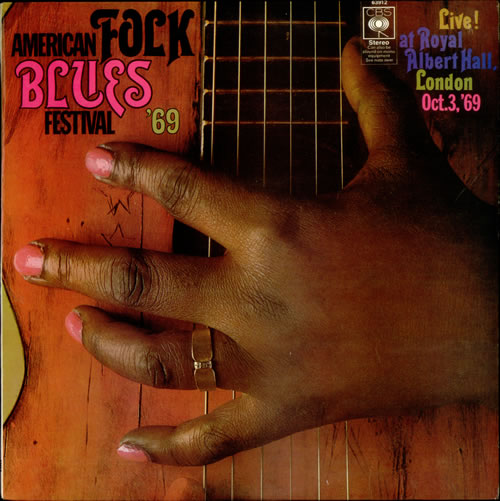
AMERICAN FOLK BLUES FESTIVAL '69
Scout
L+R
October 1969
Horst Lippmann confia l'organisation de cette édition de l'American Folk Blues Festival à Chris Strachwitz. Celui-ci rassembla une partie des bluesmen qui enregistraient pour son label Arhoolie. Et, c'est ainsi que John Jackson fut engagé pour la tournée aux côtés d'Earl Hooker, Magic Sam ou Clifton Chenier parmi d'autres. C'était la première fois qu'il traversait l'Atlantique et marchait sur le sol européen. Dans ce recueil enregistré au Royal Albert Hall de Londres, on retrouve deux de ses morceaux : "Poor boy" ou il montre sa technique à la slide et l'ébouriffant ragtime "John Jackson's breakdown".
Horst Lippmann entrusted Chris Strachwitz with the organization of American Folk Blues Festival '69. He gathered some of the bluesmen who recorded for his label Arhoolie. And that was how John Jackson was hired to tour with Earl Hooker, Magic Sam or Clifton Chenier among others. It was the first time he crossed the atlantic ocean and walked on european ground. In this record captured at the Royal Albert Hall in London, there are two of his songs : "Poor boy" where he shows his abilities on slide and the breathtaking ragtime "John Jackson's breakdown".


IN EUROPE
Arhoolie
DON'T LET YOUR DEAL GO DOWN
Arhoolie
COUNTRY BLUES & DITTIES
Arhoolie
October 1969
Pendant la tournée de l'American Folk Blues Festival, Chris Strachwitz propose à John de graver un album complet à Stuttgart (Allemagne). Ce troisième et dernier microsillon pour Arhoolie contient, en particulier, le superbe "Knife blues" (ou, comme le titre l'indique, il joue de la slide avec un couteau) ou les entrainants "Trucking little baby" et "Blind Blake's rag". "Early morning blues" figure également dans les meilleurs moments de l'album. Comme pour les précédentes parutions Arhoolie, les CDs "Don't let your deal go down" et "Country blues & ditties" reprennent une partie de la séance agrémentée de quelques inédits.
During the American Folk Blues Festival tour, Chris Strachwitz offers John to record a full album in Stuttgart (Germany). This third and final LP for Arhoolie contains, in particular, the wonderful "Knife blues" (where, as the title suggests, he plays slide with a knife) or the catchy "Trucking little baby" and "Blind Blake's rag". "Early morning blues" is also among the album highlights. As with Arhoolie previous releases, the 2 CDs "Don't let your deal go down" and "Country blues & ditties" collect a part of this session with some unpublished sides.
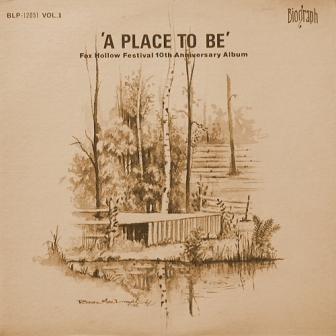
A PLACE TO BE
Biograph
1969
Attention, il existe deux éditions sensiblement différentes de cette anthologie proposée par Biograph. John figure seulement dans la seconde édition avec le morceau "Bad badman".
Be careful, there are two quite different editions of this Biograph anthology. John is only on the second edition with the track "Bad badman".
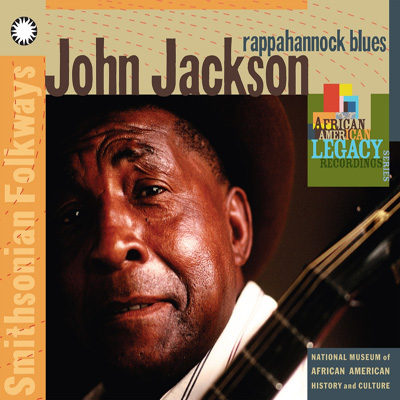
RAPPAHANOCK BLUES
Smithsonian-Folkways
July 1970 - October 1997
Ce disque assemblé par Barry Lee Pearson recueille des morceaux issus des différentes participations de John au Smithsonian Festival of American Folklife de Washington (à l'exception de deux titres gravés à Vienne). Le temps ne semble pas avoir de prise sur John tant ces concerts pris à des époques différentes montrent un artiste au sommet de ses possibilités. Quelques superbes moments : "Rocks and gravel", "Too tight rag", "John Jackson's breakdown", "Cindy" au banjo, "Step it up and go" et "Don't let your deal go down". Finalement, ce disque paru en 2010 offre un excellent panorama de l'oeuvre de ce songster. Les notes de pochette sont particulièrement fournies et intéressantes.
This CD assembled by Barry Lee Pearson collects sides from various performances at the Smithsonian Festival of American Folklife in Washington (with the exception of two titles recorded in Vienna). Time does not seem to have a hold on John as his concerts, taken at different times, show an artist at the peak of his abilities. Some great times : "Rocks and gravel", "Too tight rag", "John Jackson's breakdown", "Cindy" on banjo, "Step it up and go" and "Don't let your deal go down". Ultimately, this record published in 2010 provides an excellent overview of this songster's work. The liner notes are particularly interesting.
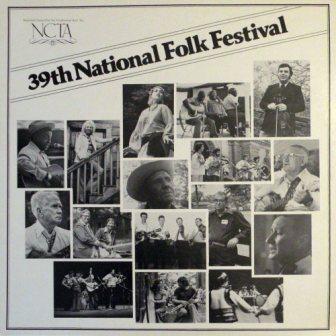
39TH NATIONAL FOLK FESTIVAL
NCTA
July 1977

THE PHILADELPHIA FOLK FESTIVAL
Flying Fish
August 1977
VIRGINIA TRADITIONS
Blue Ridge Institute
September 1977
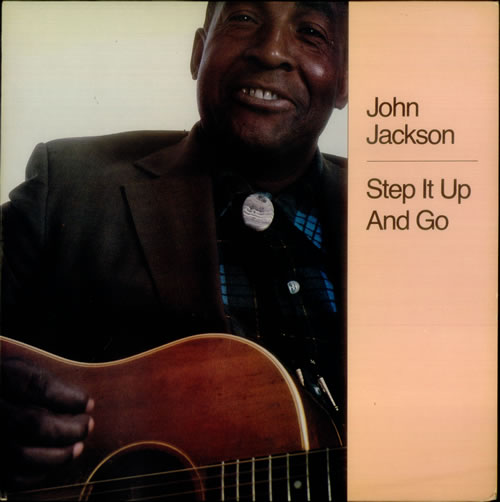
STEP IT UP AND GO
Rounder
Black & Blue
May 1978
Après ses trois disques chez Arhoolie, John Jackson prit part à plusieurs tournées aux Etats-Unis et en Europe et figura à l'affiche de nombreux festivals. Il s'agit de son premier disque studio depuis la fin des années 60. Produit par Wendy Ritger et Glenn Jones, le disque a été gravé au Mixing Lab de Newton (Massachusetts) dans la banlieue de Boston. John propose, une fois encore, une brillante démonstration de ses talents de songster.
After three records for Arhoolie, John Jackson took part in several U.S. and european tours and participated in many festivals. This is his first studio album since the late 60's. Produced by Wendy Ritger and Glenn Jones, the LP was cut at the Mixing Lab in Newton (Massachusetts) in Boston's suburbs. John gave, once again, a brilliant demonstration his songster's talents.
DEEP IN THE BOTTOM
Rounder
May 1978 / March 1982
Second album pour Rounder produit comme le précédent par Wendy Ritger et Glenn Jones. Gravé lors de deux séances (en 1978 et 1982), ce LP présente John Jackson simplement accompagné du bassiste Bill Morrison. Voix rocailleuse et jeu de guitare impeccable, il délivre un beau programme entre Folk et Blues : "Come on in this house", "Bootleggers blues", "Deep in the bottom", "Mississippi river blues".
Second album for Rounder produced as the previous by Wendy Ritger and Glenn Jones. Recorded in two sessions (in 1978 and 1982), this LP presents John Jackson simply accompanied by bassist Bill Morrison. Rocky voice and impeccable guitar playing, he delivers a nice program between Folk and Blues : "Come on in this house", "Bootleggers blues", "Deep in the bottom", "Mississippi river blues".
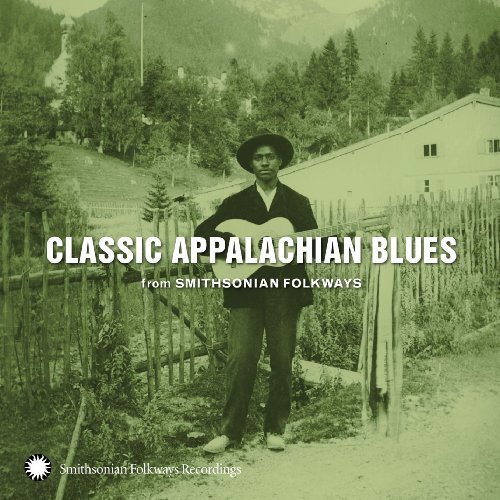
CLASSIC APPALACHIAN BLUES
Smithsonian-Folkways
June 1981
On trouve dans ce recueil un morceau de John Jackson. Il s'agit d'une reprise de "Railroad Bill" captée au Smithsonian Festival of American Folklife en 1981.
We find in this CD one John Jackson's track. This is a cover of "Railroad Bill" captured at the Smithsonian Festival of American Folklife in 1981.
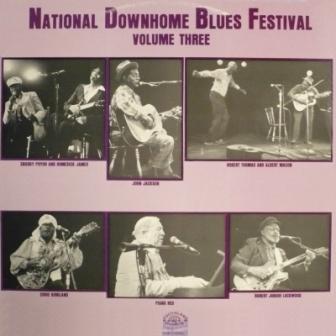
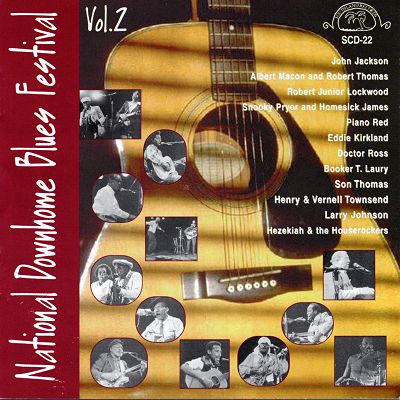
NATIONAL DOWN HOME BLUES FESTIVAL (LP vol.3 / CD vol.2)
Southland
October 1984
John figurait à l'affiche de ce festival organisé par George Mitchell en 1984. On retrouve trois de ses titres dans le disque édité pour l'occasion dont une belle version de "Rocks and gravel".
John was part of this festival organized by George Mitchell in 1984. We find three of his titles in this disc including a beautiful version of "Rocks and gravel".
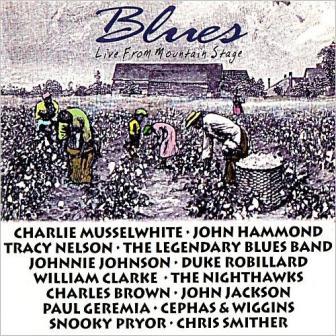
BLUES LIVE FROM MOUNTAIN STAGE
Blue Plate
Early 1990's
Il s'agit d'un des recueils discographiques d'une émission radiophonique animée par Larry Groce ou les musiciens sont enregistrés en public. John Jackson y participa au début des années 90. Sur ce CD, il interprète "Louisiana blues".
This is a recordings collection from a radio show hosted by Larry Groce where different musicians are recorded live. John Jackson performed there in the early 90's. On this CD, he played "Louisiana blues".
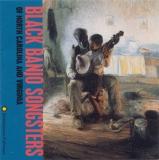
BLACK BANJO SONGSTERS
Smithsonian-Folkways
March 1997
Particulièrement habile au banjo, John Jackson figure sur cette anthologie dédiée à l'instrument avec une version de "Going up north".
Particularly skilful on banjo, John Jackson is presented on this anthology dedicated to the instrument with a version of "Going up north".
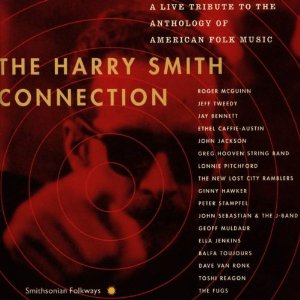
THE HARRY SMITH CONNECTION
Smithsonian-Folkways
October 1997
Deux beaux morceaux de John Jackson capturés sur une scène locale (dont une reprise de l'air traditionnel "John Henry").
Two nice John Jackson tracks captured on a local stage (including a cover of the traditional tune "John Henry").
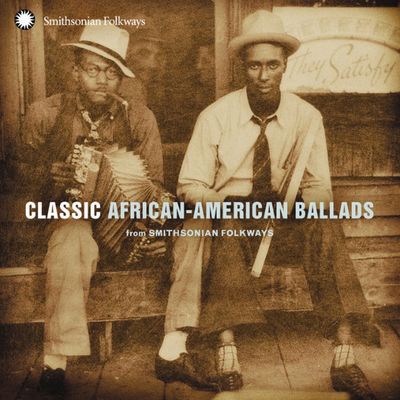
CLASSIC AFRICAN-AMERICAN BALLADS
Smithsonian-Folkways
October 1997
Deux autres morceaux de John Jackson issus du même concert (le beau "Louis Collins" en fingerpicking).
Two other John Jackson pieces from the same concert (the beautiful "Louis Collins" in fingerpicking).
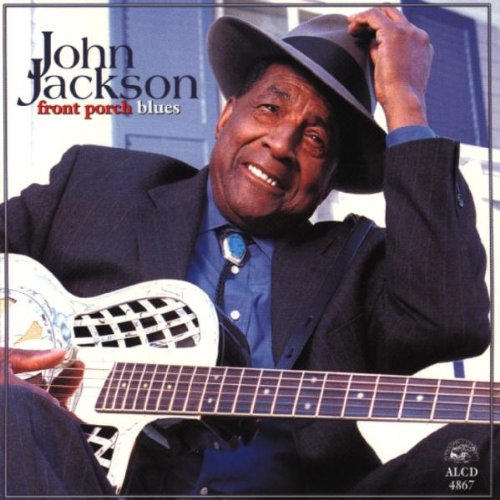
FRONT PORCH BLUES
Alligator
June 1999
Malgré une série de catastrophes personnelles (décès de sa femme Cora en 1990 et de trois de ses enfants), John reste actif grâce à l'appui de son agent Trish Byerly dans les années 80 et 90. Il apparait dans de nombreux festivals aux Etats-Unis et en Europe ou il remporte souvent un franc succès. Il a finalement l'occasion d'enregistrer cet album pour Alligator (produit par Trish Byerly et Joe Wilson) en 1999. A 75 ans, John montre ici qu'il est toujours en pleine forme. Malgré une voix un peu affaiblie, sa musique reste parfaitement maitrisée. Son jeu de guitare, notamment, est comme au premier jour. Il joue son répertoire habituel de songster entre blues, country, folk avec conviction. On remarque une reprise de "Death don't have no mercy" empruntée au Reverend Gary Davis. John Jackson est décédé en 2002 des suites d'un cancer du foie.
Despite a serie of personal disasters (death of his wife Cora in 1990 and three of his children), John remains active with the support of his agent Trish Byerly in the 80's and 90's. He participated in numerous festivals in the United States and Europe where he often won success. He eventually found the opportunity to record this album for Alligator (produced by Trish Byerly and Joe Wilson) in 1999. At 75, John shows here that he is still in top condition. Despite a somewhat weak voice, his music remains perfectly mastered. His guitar playing, especially, is like the first day. He plays his usual songster repertoire between blues, country, folk with conviction. We note a cover of "Death don't have no mercy" borrowed from the Reverend Gary Davis. John Jackson died in 2002 as the result of a liver cancer.